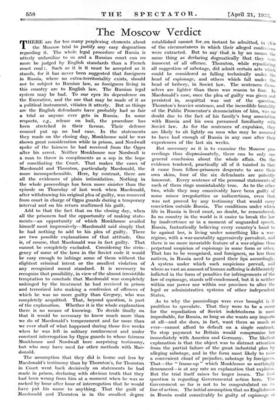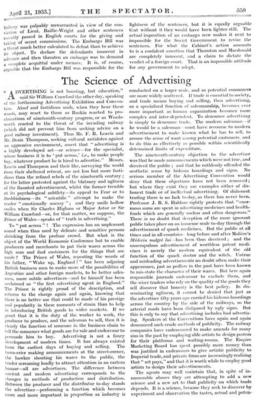The Moscow Verdict
THERE are far too many perplexing elements about the Moscow trial to justify any easy dogmatism, regarding it. The whole. legal procedure of Russia is utterly unfamiliar to us and a Russian court can no, more be judged by English standards than a French court cool 1. Such as it is it must be accepted as it system may be bad. To our eyes its dependence on the Executive, and the use that may be made of it as a political instrument, vitiates it utterly. But as things are the English defendants have probably had as fair a trial as anyone ever gets in Russia. In some respects, e.g., release on bail, the procedure has been stretched in their favour. Their defence counsel put up no bad case. In the statements they made on the closing day, Monkhouse said he was shown great consideration while in prison, and Nordwall spoke of the fairness he had received from the Ogpu after his arrest. Neither Monkhouse nor Nordwall is a man to throw in compliments as a sop in the hope of conciliating the Court. That makes the cases of Macdonald and Thornton, particularly Macdonald, the more incomprehensible. Here, by contrast, there are all the evidences of plain intimidation. Nothing in the whole proceedings has been more sinister than the episode on Thursday of last week when Macdonald, after withdrawing his original plea of guilty, was removed from court in charge of Ogpu guards during a temporary interval and on his return reaffirmed his guilt.
Add to that the fact that on the closing day, when all the prisoners had the opportunity of making state- ments—an opportunity of which Monkhouse availed himself most impressively—Macdonald said simply that he had nothing to add to his plea of guilty. There are two possible explanations of that attitude. One is, of course, that Macdonald was in fact guilty. That cannot be completely excluded. Considering the strin- .
gency of some of the laws in the Soviet code it would be easy enough to infringe some of them without the slightest criminal intent or the smallest violation of any recognized moral standard. It is necessary to recognize that possibility, in view of the almost irresistible temptation to conclude that Macdonald was completely unhinged by the treatment he had received in prison and terrorized into making a confession of offences of which he was no more guilty than Gregory, who was completely acquitted. That, beyond question, is part of the explanation. Whether it is the whole explanation there is no means of knowing. To decide: finally on that it would be necessary to know much more than we do of Macdonald's temperament and far more than we ever shall of what happened during those five weeks when he was left in solitary confinement and under constant interrogation by Ogpu guards to whose fairness Monkhouse and Nordwall bore surprising testimony, but who may have used far other methods with Mac- donald.
The assumption that they did is borne out less by Macdonald's testimony than by Thornton's, for Thornton in Court went back decisively on statements he had made in prison, declaring with obvious truth that they had been wrung from him at a moment when he was so racked by hour after hour of interrogation that he would _have put his name to anything. That the guilt of Macdonald and Thornton is in the smallest degree established cannot for ,an instant be admitted, in vtar of the circumstances in which their alleged confessions were extracted. But to say that is by no means the same thing as declaring dogmatically that they Were innocent of all offence. Thornton, while repudiating all suggestion of sabotage, did admit certain acts which could be considered as falling. technically under the head of espionage, and others which fall under the head of bribery, in Soviet law. The sentences them- selves are lighter than there was reason to fear. in Macdonald's case, once the plea of guilty was given and persisted in, acquittal was out of the question. Thornton's heavier sentence, and the incredible brutality of the Public Prosecutor's denunciation of him, was no doubt due to the fact of his family's long association with Russia and his own presumed. familiarity with Soviet law. As for the sentences of expulsion, they are likely to sit lightly on men who may be assumed to have had enough of Russia in any ease after their experiences of the last six weeks.
But necessary as it is to examine the Moscow pro. ceedings thus dispassionately, there can be only one general conclusion about the whole affair. On the evidence tendered,. practically all of it tainted in that it came from fellow-prisoners desperate to save their own skins, four of the six defendants are patently innocent. Every sentence of the personal statements of each of them rings unmistakably. true. As to the other two, while they may conceivably have been guilty of some minor irregularities or indiscretions, even that was not proved by any testimony that would carry conviction outside Russia. The conditions under which life in Russia is lived must, no doubt, be remembered. In no country in the world is it easier to break the law by inadvertence or in a moment of unguarded speech. Russia, fantastically believing every Country's hand to be against her, is living under something like a war- regime, with a war-mentality aggressively prevalent, and there is no more invariable feature of a war-regime than perpetual suspicion of espionage in some form or other. That has to be recognized, and foreigners, no less than natives, in Russia need to guard their lips accordingly. A system under which such suspicions prevail, and where so vast an amount of human suffering is deliberately inflicted in .the form of penalties for infringements of the law of espionage, stands self-condemned, but it is neither within our power nor within our province to alter the legal or administrative systems of other independent States.
As to why the proceedings were ever brought is it profitless to speculate. That they were to be a cover for the repudiation of 'Soviet indebtedness is most improbable, for Russia, so long as she wants any imports at all—and she does, in fact, want them as much as ever—cannot afford to default on a single contract. To stop payment to Britain would compromise her immediately with America and Germany. The likeliest explanation is that the object was to distract attention from the partial failure of the great industrial plan by alleging sabotage, and in the form most likely to raise a convenient cloud of prejudice, sabotage by foreigners. That—the " frame-up " which Monkhouse so scathingly denounced—is at any rate an explanation that explains. But the trial itself raises far larger issues. The first question is regarding Governmental action here. The Government so far is not to be congratulated on its line of action. The initial assumption that no Englishman in Russia could conceivably be guilty of espionage or bribery was palpably unwarranted in view of the con- viction of Lieut. Baillie-Wright and other sentences recently passed in English courts for the giving and taking of secret commissions. The Embargo Bill was a threat much better calculated to defeat than to achieve its object. To declare the defendants innocent in advance and then threaten an embargo was to demand a complete acquittal under menace. It is, of course, arguable that the Embargo Bill was responsible for the lightness of the sentences, but it is equally arguable that without it they would have been lighter still. The actual imposition of an embargo now makes it next to impossible for the Soviet Government to revise the sentences. For what the Cabinet's action amounts to is a confident assertion that Thornton and Macdonald are completely innocent, and a claim to dictate the verdict of a foreign court. That-is an impossible attitude for any government to adopt.







































 Previous page
Previous page